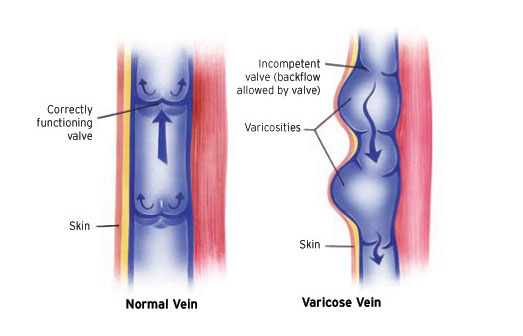When it comes to medical procedures, whether it’s a simple injection or a complex surgery, patients are often concerned about pain and discomfort. Varicose vein treatment varies depending on the size of the damaged vein. One of the less complex treatment options for small veins is ambulatory phlebectomy. If you have heard of this treatment option and are considering it, you may have wondered, does ambulatory phlebectomy hurt?
How do varicose veins develop?
Veins carry oxygen-rich blood from around the body, back up to the heart. However, when vein valves, or vein walls, become damaged, blood starts leaking backwards. As well as swelling and skin discolouration, one of the symptoms of CVI is varicose veins. When blood can’t flow back up to the heart, it begins to reflux or pool, forming the twisted, enlarged vessels you know as varicose veins.
Varicose veins: who is most vulnerable?
The most common reason why varicose veins form is unfortunately out of your control. Both maternal and paternal genetics are a significant factor in your vulnerability to vein disease. In short, your unique genetic profile determines the strength of your vein walls, valves and muscle density. All of these factors provide support to your circulatory system.
Another significant contributor which is not within your control is age. As each year passes, the aging process results in wear and tear on blood vessels and vein valves that regulate healthy blood flow. When this happens, the faulty valves start allowing small amounts of blood to flow back and reflux in your veins instead of being returned to the heart.
Learn more: Varicose vein causes.
Treating varicose veins
Treatment for varicose veins ranges from self-care options for pain and symptom management, non-surgical treatments such as those which are offered at The Vein Institute, and in-hospital surgical procedures.
Our level of comfort during a procedure isn’t just important for how we feel at the time, it can also have a big impact on the aftercare and recovery of the affected area. Especially when you hear the words incision and removal, it’s understandable to be apprehensive.
If your doctor recommends ambulatory phlebectomy, it’s important to know that not only is the procedure itself safe and effective, it’s also relatively pain-free. To help you understand how it works and how you’re safe from pain, we’ve outlined how it works below.
Does ambulatory phlebectomy hurt?
Try saying it five times fast and you might be a bit flabbergasted. While it might sound like something complicated and overwhelming, it’s a relatively simple procedure. It is the surgical removal of surface-level varicose veins, using keyhole surgery to make tiny incisions as small as 1mm. Through these keyhole incisions, small sections of the vein are removed with the aid of an ultrasound machine.
This is done under local anaesthesia, which means the most pain you’ll feel is a light pinprick of the needle for a second. This also means it can be done very quickly (usually just a few minutes) and leaves no scarring.
This procedure is most often done alongside sclerotherapy, which is a procedure to seal off and remove the deeper varicose veins in the legs. This procedure is also relatively pain-free and quick, meaning there’s no need for general anaesthetic or a hospital visit.
Does recovery after ambulatory phlebectomy hurt?
That really depends on you. While it’s not as invasive as surgical stripping, phlebectomy is still a surgical procedure. You can expect some discomfort as the skin heals from the incisions and the body recovers. Generally, you can manage discomfort through compression, elevation, and over-the-counter pain relief. Do note, however, recovery can take between 7 and 21 days.
So why should I have it done?
If you’ve got varicose veins, there’s an initial cosmetic concern of how the veins look, which is what often prompts people to start exploring their options. However, varicose veins can often indicate a more serious underlying issue, most often venous insufficiency. By undergoing the removal of current varicose veins and following treatment with compression stockings and lifestyle changes, you give your veins the best chance at long-term recovery.
Ambulatory phlebectomy in combination with sclerotherapy offers minimal intrusion and a pain-free experience which you can have done in the day and then walk out and head home comfortably with very minimal risk (bruising and mild swelling and some mild numbness are the main risks which are relatively unlikely).
Seek expert advice
The doctors at The Vein Institute specialise in varicose vein treatment. We offer patients a comprehensive program using non-surgical laser treatment techniques. You can learn more in our Definitive Guide to Varicose Vein Treatment.
The benefits of non-surgical varicose vein treatment are:
- Walk-in walk-out treatment
- 98% success rate
- Extremely effective
- Can be performed at a clinic (no hospitalisation)
- No general anaesthetic
- Medicare rebates apply
- No downtime or time away from work
Call us on 0420 102 637, or fill out our booking request form.



